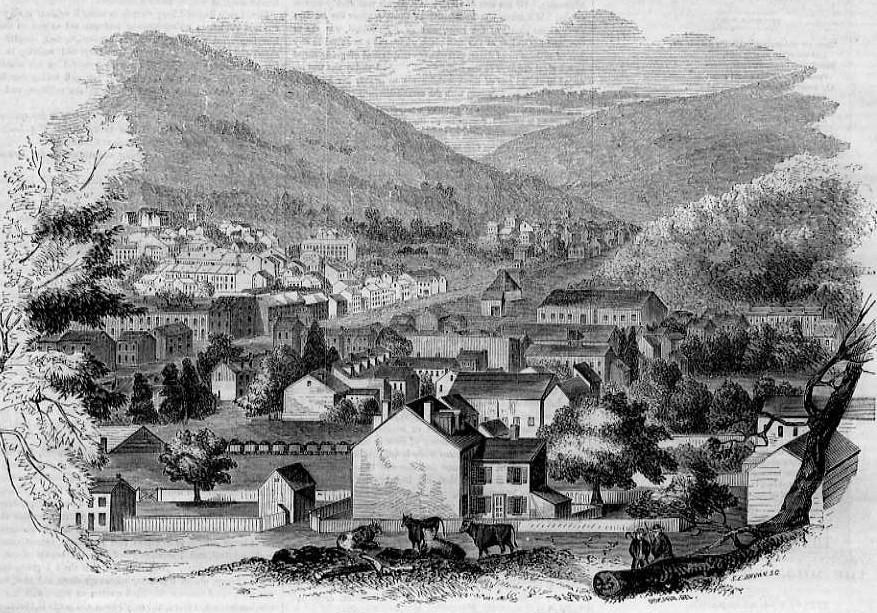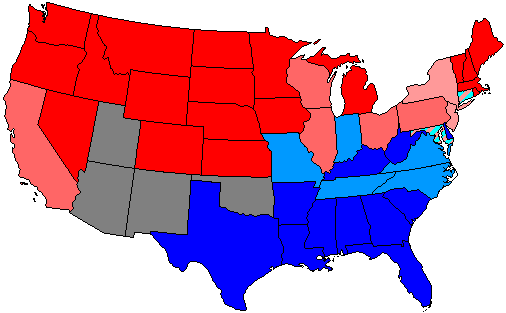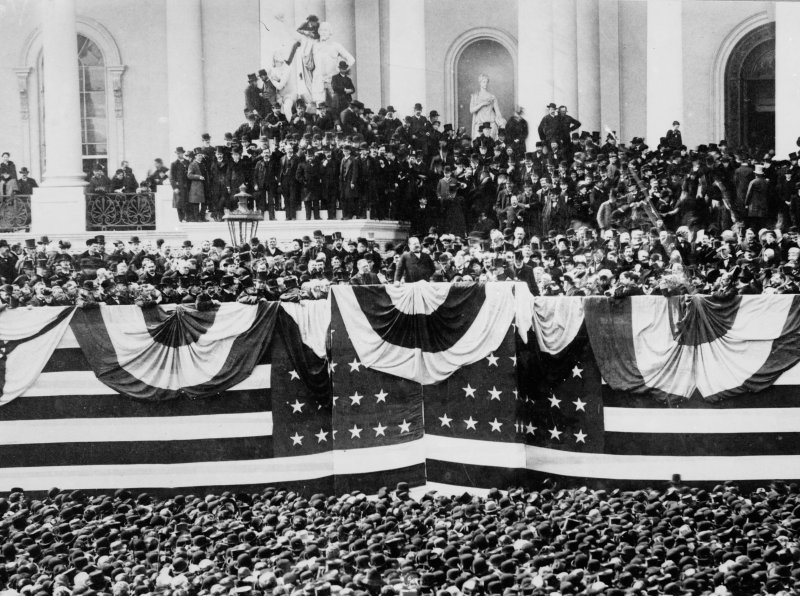|
Charles N. Brumm
Charles Napoleon Brumm (June 9, 1838 – January 11, 1917) was a Greenbacker and a Republican member of the U.S. House of Representatives from Pennsylvania. Early life and education Charles N. Brumm was born in Pottsville, Pennsylvania. He attended the common schools and Pennsylvania College in Gettysburg, Pennsylvania. He studied law for two years. Civil War Under the first call of President Abraham Lincoln for three-months’ men, Brumm enlisted as a private and was elected the first lieutenant of Company I, Fifth Regiment, Pennsylvania Volunteer Infantry. He reenlisted in 1861 for three years and was elected first lieutenant of Company K, Seventy-sixth Regiment, Pennsylvania Volunteer Infantry. He was detailed on the staff of General Barton as assistant quartermaster and aide-de-camp, which position he held under General Barton and General Galusha Pennypacker until the expiration of his term of service in 1871. Congressional service After the war Brumm resumed the stud ... [...More Info...] [...Related Items...] OR: [Wikipedia] [Google] [Baidu] |
Pottsville, Pennsylvania
Pottsville is the county seat of Schuylkill County, Pennsylvania, United States. The population was 13,346 at the 2020 census, and is the principal city of the Pottsville, PA Micropolitan Statistical Area. The city lies along the west bank of the Schuylkill River, south of Wilkes-Barre, Pennsylvania, Wilkes-Barre. It is located in Pennsylvania's Coal Region. Pottsville is located west of Allentown, Pennsylvania, Allentown, northwest of Philadelphia, and west of New York City. History Early settlement Charles II of England, Charles II granted the land that would eventually become Pottsville to William Penn. This grant comprised all lands west and south of the Delaware River and the Schuylkill; the site of Pottsville was originally in Chester County, Pennsylvania, Chester County. When the legislative Council, on May 10, 1729, enacted the law erecting Lancaster County, Pennsylvania, Lancaster County, which included all the lands of the Province lying westward of a straight line ... [...More Info...] [...Related Items...] OR: [Wikipedia] [Google] [Baidu] |
Galusha Pennypacker
Uriah Galusha Pennypacker (June 1, 1841/1844 – October 1, 1916) was a Union general during the American Civil War. He may be the youngest person to hold the rank of brigadier general in the US Army; at the age of 20, he remains the only general too young to vote for the president who appointed him. Early life Pennypacker was born supposedly June 1, 1844, but the year is uncertain. Census and other records indicate an earlier year of birth, perhaps 1840–41; his death record cites June 1, 1842. Ages in this article are based on the 1844 date. He was born in Valley Forge, Pennsylvania, to a family with a long history of military service. He was raised without having any memory of his parents, Joseph Judson Pennypacker (1814–1880?) and Tamson A. Workheiser. His mother died when he was still a baby, and his father, who had taken part in the Mexican–American War, later became an adventurer in California, where he founded the ''Petaluma Argus'' newspaper in 1859 and sold it in Dec ... [...More Info...] [...Related Items...] OR: [Wikipedia] [Google] [Baidu] |
60th United States Congress
The 60th United States Congress was a meeting of the legislative branch of the United States federal government, composed of the United States Senate and the United States House of Representatives. It met in Washington, DC from March 4, 1907, to March 4, 1909, during the last two years of Theodore Roosevelt Theodore Roosevelt Jr. ( ; October 27, 1858 – January 6, 1919), often referred to as Teddy or by his initials, T. R., was an American politician, statesman, soldier, conservationist, naturalist, historian, and writer who served as the 26t ...'s Presidency of Theodore Roosevelt, presidency. The apportionment of seats in the House of Representatives was based on the United States Census, 1900, Twelfth Census of the United States in 1900. Both chambers had a Republican Party (United States), Republican majority. Major events Major legislation * May 30, 1908 — Aldrich-Vreeland Act, ch. 229, * 1908 — The Federal Employers Liability Act (FELA), Title 45 of the Uni ... [...More Info...] [...Related Items...] OR: [Wikipedia] [Google] [Baidu] |
59th United States Congress
The 59th United States Congress was a meeting of the legislative branch of the United States federal government, composed of the United States Senate and the United States House of Representatives. It met in Washington, D.C. from March 4, 1905, to March 4, 1907, during the fifth and sixth years of Theodore Roosevelt's presidency. The apportionment of seats in the House of Representatives was based on the Twelfth Census of the United States in 1900. Both chambers had a Republican majority. Major events *March 4, 1905: President Theodore Roosevelt began his second (only full) term. Major legislation * May 28, 1906: Foreign Dredge Act of 1906 * June 8, 1906: Antiquities Act * June 29, 1906: Hepburn Act * June 30, 1906: Pure Food and Drug Act of 1906 (Wiley Act), ch. 3915, * June 30, 1906: Meat Inspection Act (Beveridge Act) * 1906: The Carnegie Foundation for the Advancement of Teaching chartered. * March 2, 1907: Expatriation Act of 1907, Party summary Senate House of ... [...More Info...] [...Related Items...] OR: [Wikipedia] [Google] [Baidu] |
United States House Election, 1898
The 1898 United States House of Representatives elections were held during the middle of President William McKinley's first term. As in many midterm elections, the President's Republican Party lost seats, but was able to hold a majority over the Democratic Party. The Populist Party also lost many seats, as their movement began to decline. This was likely because many Populists rallied behind William Jennings Bryan's increasingly powerful branch of the Democratic Party, which built the rural economic issues advocated by Populists into their platform. As a result, the Democrats won a number of Western seats as well many in the Mid-Atlantic. Election summaries The previous elections of 1896 saw the election of 24 Populists, 2 Silver Republicans, and a Silver Party member. Special elections } , - ! , William V. Sullivan , , Democratic , 1896 , , Incumbent resigned when appointed U.S. senator.New member elected July 5, 1898.Democratic hold. , nowrap , , ... [...More Info...] [...Related Items...] OR: [Wikipedia] [Google] [Baidu] |
United States House Committee On Claims
The U.S. House Committee on the Judiciary, also called the House Judiciary Committee, is a standing committee of the United States House of Representatives. It is charged with overseeing the administration of justice within the federal courts, administrative agencies and Federal law enforcement entities. The Judiciary Committee is also the committee responsible for impeachments of federal officials. Because of the legal nature of its oversight, committee members usually have a legal background, but this is not required. In the 117th Congress, the chairman of the committee is Democrat Jerry Nadler of New York, and the ranking minority member is Republican Jim Jordan of Ohio. History The committee was created on June 3, 1813 for the purpose of considering legislation related to the judicial system. This committee approved articles of impeachment against Presidents in five instances: Andrew Johnson (1867 and 1868), Richard Nixon (1974), Bill Clinton (1998), and Donald Trump (201 ... [...More Info...] [...Related Items...] OR: [Wikipedia] [Google] [Baidu] |
55th United States Congress
The 55th United States Congress was a meeting of the legislative branch of the United States federal government, composed of the United States Senate and the United States House of Representatives. It met in Washington, DC from March 4, 1897, to March 4, 1899, during the first two years of William McKinley's presidency. The apportionment of seats in the House of Representatives was based on the Eleventh Census of the United States in 1890. Both chambers had a Republican majority. There was one African-American member, George Henry White, a Republican from the state of North Carolina, and one Kaw member, Charles Curtis, a Republican from Kansas. Major events * March 4, 1897: William McKinley became President of the United States. * February 15, 1898: Spanish–American War: USS ''Maine'' exploded in Havana harbor. * December 10, 1898: Treaty of Paris ended Spanish–American War, . Major legislation * July 24, 1897: Dingley tariff, ch. 11, , increased trade duties for revenu ... [...More Info...] [...Related Items...] OR: [Wikipedia] [Google] [Baidu] |
54th United States Congress
The 54th United States Congress was a meeting of the legislative branch of the United States federal government, consisting of the United States Senate and the United States House of Representatives. It met in Washington, D.C. from March 4, 1895, to March 4, 1897, during the last two years of Grover Cleveland's second presidency. The apportionment of seats in the House of Representatives was based on the Eleventh Census of the United States in 1890. The House had a Republican majority, and the Republicans were the largest party in the Senate. Major events Major legislation * May 21, 1896: Oil Pipe Line Act, ch. 212, ( et seq.) * May 22, 1896: Condemned Cannon Act, * May 28, 1896: United States Commissioners Act, * June 1, 1896: Married Women's Rights Act (District of Columbia), * June 6, 1896: Filled Cheese Act, * January 13, 1897: Stock Reservoir Act, , ( et seq.) * March 2, 1897: Tea Importation Act, , ( et seq.) States admitted * January 4, 1896: Ut ... [...More Info...] [...Related Items...] OR: [Wikipedia] [Google] [Baidu] |
1884 Republican National Convention
The 1884 Republican National Convention was a presidential nominating convention held at the Exposition Hall in Chicago, Illinois, on June 3–6, 1884. It resulted in the nomination of former House Speaker James G. Blaine from Maine for president and Senator John A. Logan of Illinois for vice president. The ticket lost in the election of 1884 to Democrats Grover Cleveland and Thomas A. Hendricks. In attendance were 1600 delegates and alternates and 6000 spectators. There were 820 official delegates; 411 votes were needed to win the nomination. The incumbent president, Chester A. Arthur, was not a serious contender due to ill health. Blaine was the favorite going in, but there was a possibility that President Arthur could build a coalition with smaller candidates such as George F. Edmunds. There were also rumors that members of the party would bolt if Blaine won the nomination. Neither Blaine nor Arthur were in attendance. Blaine was at his home in Augusta, Maine, and Arthur foll ... [...More Info...] [...Related Items...] OR: [Wikipedia] [Google] [Baidu] |
United States House Election, 1888
The 1888 United States House of Representatives elections were held at the same time as the election of President Benjamin Harrison. Harrison's Republican Party gained a majority in the House at the expense of the Democratic Party, even though incumbent President Grover Cleveland actually received more votes counted than Harrison. However, as in other elections in the period, widespread vote suppression and fraud was common on behalf of Democrats and against black Republicans in the South. The Republican House majority in uncontested elections unseated a number of initially reported as victorious Democratic candidates in favor of Republican candidates who contested their election loss. The issue of tariffs played a key role in this election. The Democrats, with the support of farmers and laborers, wanted to lower tariffs in order to promote free trade, while the Republicans, backed by industry and big business, believed that higher tariffs were necessary to protect American manufa ... [...More Info...] [...Related Items...] OR: [Wikipedia] [Google] [Baidu] |
50th United States Congress
The 50th United States Congress was a meeting of the legislative branch of the United States federal government, consisting of the United States Senate and the United States House of Representatives. It met in Washington, D.C. from March 4, 1887, to March 4, 1889, during the third and fourth years of Grover Cleveland's first presidency. The president vetoed 212 pieces of legislation, the greatest number in a single session of Congress. The apportionment of seats in the House of Representatives was based on the 1880 United States census. The Senate had a Republican majority, and the House had a Democratic majority. Major events Major legislation * October 8, 1888: Chinese Exclusion Act ( Scott Act) * January 14, 1889: Nelson Act of 1889 * February 22, 1889: Enabling Act of 1889, Sess. 2, ch. 180, Party summary The count below identifies party affiliations at the beginning of the first session of this Congress, and includes members from vacancies and newly admitted states, w ... [...More Info...] [...Related Items...] OR: [Wikipedia] [Google] [Baidu] |
49th United States Congress
The 49th United States Congress was a meeting of the legislative branch of the United States federal government, consisting of the United States Senate and the United States House of Representatives. It met in Washington, D.C. from March 4, 1885, to March 4, 1887, during the first two years of Grover Cleveland's first presidency. The apportionment of seats in the House of Representatives was based on the Tenth Census of the United States in 1880. The Senate had a Republican majority, and the House had a Democratic majority. Major events * March 4, 1885: Grover Cleveland became President of the United States * November 25, 1885: Vice President Thomas A. Hendricks died Major legislation * January 19, 1886: Presidential Succession Act of 1886, ch. 4, * February 3, 1887: Electoral Count Act, ch. 90, * February 4, 1887: Interstate Commerce Act, ch. 104, * February 8, 1887: Indian General Allotment Act ("Dawes Act"), ch. 119, * March 2, 1887: Agricultural Experiment Statio ... [...More Info...] [...Related Items...] OR: [Wikipedia] [Google] [Baidu] |





